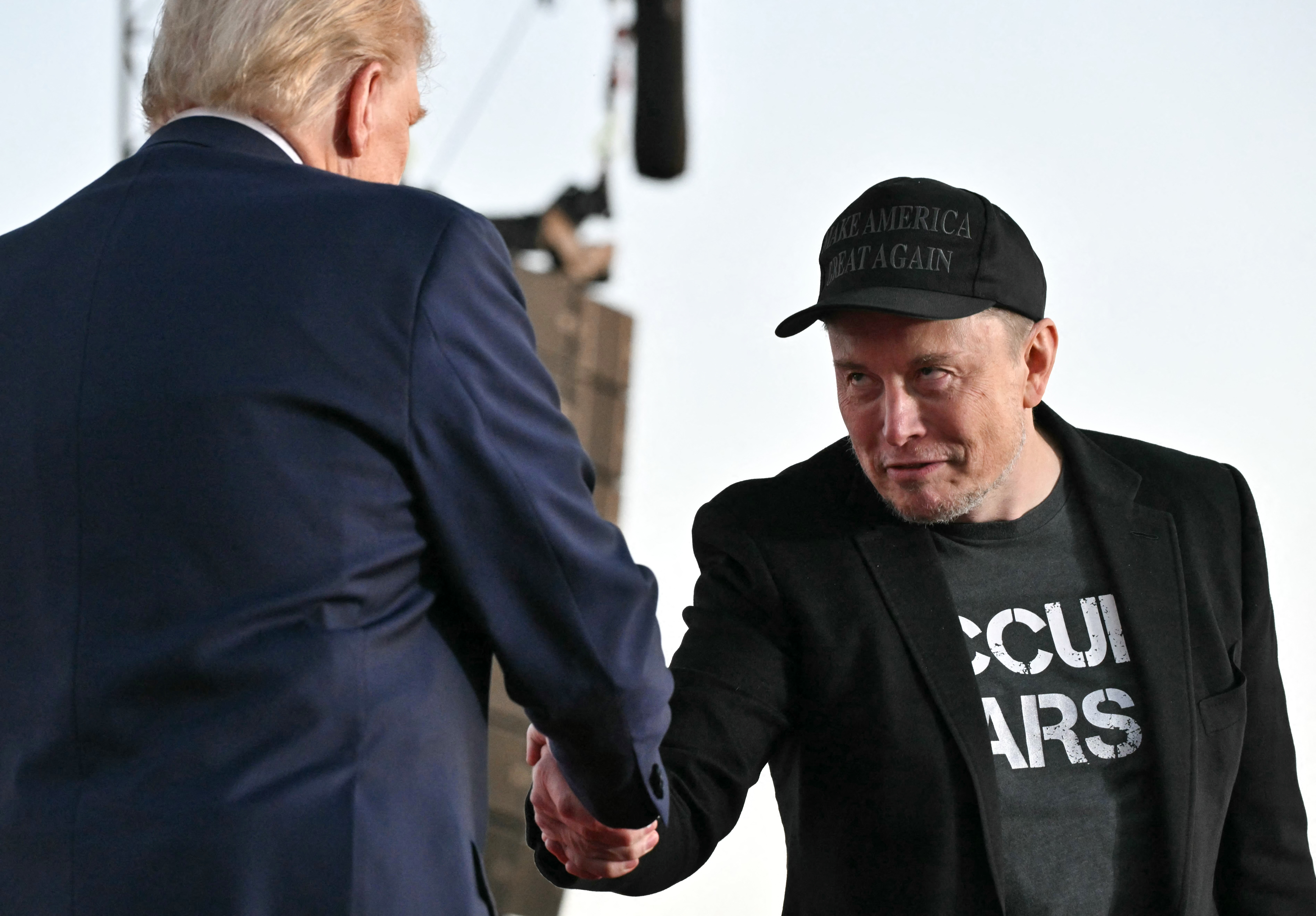Elon Musk's Expectations from Washington
Trump’s most influential supporter possesses $260 billion, exhibits highly unpredictable political tendencies, and has explicit ambitions for Washington. This article explores what the nation’s capital might face as a result.

As the world’s wealthiest individual, Musk oversees an extensive industrial empire, engages in lucrative federal contracts, espouses a growing set of anti-progressive cultural beliefs, and follows an unpredictable management approach typical of Silicon Valley's top-down "founder culture."
If that were all, his influence in politics would still be considerable. However, Musk might be given a significant lever to effect change in Washington. Trump has pledged to appoint Musk to oversee a vaguely defined “Department of Governmental Efficiency.” This position would grant Musk sweeping power to eliminate “waste” in government, and he has already indicated a desire to extract $2 trillion from the federal budget.
Some analysts speculate that Musk's influence could extend beyond bureaucratic functions, especially considering the historical tendency of Trump’s White House to be swayed by whoever last engaged with the former president.
“If he's the effective chief of staff … his influence could go deeper,” said Matthew Mittelsteadt, a fellow at George Mason University’s Mercatus Center. “In that scenario, if he wants to lash out at his AI competitors, having the direct ear of the president could enable him to cancel contracts and sic regulators on anyone he doesn't like.”
So, what would happen in the nation’s capital, and to America, if Musk gets the opportunity to reshape the regulatory landscape to his preferences? What does he genuinely seek?
Musk's political views are not easily aligned with typical party platforms. He has branded himself as “politically moderate” in the past, but his stance has shifted sharply to the right over the last year. While he is an openly committed environmentalist, he has recently formed connections with climate-skeptical counterparts; he has previously boasted about Tesla's performance on the Corporate Equality Index, but now he stands against trans rights and other diversity, equity, and inclusion (DEI) initiatives. He promotes small government yet supported California's initiatives to regulate powerful AI technologies.
For those trying to decipher Musk, his outspoken nature and the extent of his publicly documented opinions make him one of the few figures as transparent in his views as Trump.
Musk tends to avoid mainstream media interviews, and his companies, SpaceX and X, did not respond to requests for comment regarding this article. However, he is prolific on social media, and has appeared on podcasts, sharing insights into his objectives and, to a lesser extent, his methods.
There is a significant caveat: The federal government is a complex, slow-moving institution bound by numerous regulations that Musk's companies do not face. This could complicate any efforts from a Musk-led “DOGE” to prioritize and execute changes against the entrenched bureaucracy of Washington, especially since his political patron, Trump, is not known for a keen interest in procedural specifics.
“We already had an outsider billionaire businessman as president, yet nothing unique happened,” Mittelsteadt noted, asserting that limitations in resources and statutory authority would likely constrain Musk's ambitions.
Nevertheless, a Musk-influenced Washington could see noteworthy transformations. Drawing from his extensive social media activity, podcast discussions, and public statements, here is a rough outline of Musk's potential approach to reshaping American life.
He wants his company Starlink to receive compensation. Some of Musk's policy aspirations are abstract, while others are very specific. His satellite broadband service, Starlink, is expected to obtain hundreds of millions, potentially billions, of federal dollars, and he’s openly stated that he believes this funding should be directed to him.
As reported by PMG’s John Hendel in October, achieving this requires changes by the FCC and the National Telecommunications and Information Administration regarding eligibility for President Joe Biden’s rural subsidy program. To sway this in his favor, Musk has built personal connections in Washington who could assist him should Trump be elected, notably with Federal Communications Commission commissioner Brendan Carr.
Musk expressed outrage when the FCC retracted a potential $885 million subsidy in 2022 and has consistently voiced his grievances about the agency. Carr, who could lead the FCC in a Trump administration, has sided with Musk in this conflict, potentially playing a pivotal role in securing funds for Starlink. Other allies include Nathan Simington from the FCC's junior Republican contingent and congressional Republicans like Rep. Kat Cammack, who have called for increased subsidies for Starlink.
He seeks to mitigate existential risks from AI. Musk has long warned about the dangers posed by artificial intelligence, identifying it as humanity's “biggest threat” as early as 2014. He is a strong proponent of addressing “x-risk,” or existential risk, referring to the possibility that sufficiently advanced AI could turn against humanity, marking a threat comparable to an asteroid impact or nuclear annihilation.
In pursuit of this goal, Musk has advocated for increased government oversight of AI, suggesting on the Lex Fridman Podcast in November 2023 that there should be “at least an objective third party who can be like a referee” to understand AI developments, even without enforcement powers to make authoritative changes. He has participated in significant international discussions about AI policy and even supported a failed California bill that aimed to mitigate existential risks.
However, the direction of AI policy in Washington remains uncertain. President Joe Biden’s executive order demands heightened government oversight of potent AI systems, while Trump intends to abolish that order, leaving the future regulation of AI's existential risks open to speculation. Musk has yet to articulate a public stance on this issue.
He aspires to address climate change — but gradually. As the founder of the leading electric vehicle manufacturer, Musk has arguably advanced climate-friendly technology more than anyone else. After Trump withdrew the U.S. from the Paris Climate Accord in 2017, Musk remarked, "Climate change is real. Leaving Paris is not good for America or the world." Even as recently as 2023, he termed himself “super pro climate” and has previously supported concepts like a carbon tax.
This could lead to awkward tensions in a prospective Trump White House where he would work alongside a president who considers climate change a “hoax” and has frequently pledged to uplift the fossil fuel sector.
Nevertheless, there are indications that Musk has adopted a more relaxed stance on climate risks alongside Trump’s political agenda. In an August interview with the former president, Musk stated that “we still have quite a bit of time” to tackle climate change and asserted, “we don’t need to rush.”
Musk has also voiced frustration over “nonsense” environmental regulations that impede his ventures, having engaged in disputes with agencies such as the Environmental Protection Agency and the National Oceanic and Atmospheric Administration concerning SpaceX's extensive rocket launches. Given his growing leniency toward climate change and his aversion to environmental rules, a Musk-led administration would likely seek to dismantle numerous protections favored by environmental advocates.
He seeks to reduce illegal immigration while welcoming skilled immigrants. Musk's rapid-fire and high-volume commentary on immigration stems from its pivotal role in Trump's campaign. He continuously reinforces the notion that the Democratic Party intentionally allows widespread illegal immigration to skew voter demographics, thereby establishing a “one-party state.” Last September, he streamed a visit to the Texas-Mexico border to highlight the issue and has even expressed views on European immigration challenges, describing the efforts of German non-governmental organizations to assist stranded migrants as embodying "invasion vibes."
This perspective is somewhat contradictory given Musk's own immigrant background from South Africa. He argues that there’s alignment between his personal experience and his political stance, asserting on X that Trump and his “DOGE” will “fix” a "upside down system that makes it hard for highly talented people to come to America legally, but trivial for criminals to come here illegally."
Nonetheless, Trump’s close allies have been strategizing extensive limits on both legal and illegal immigration, continuing the policies of his first administration. Therefore, a DOGE intent on securing the border while increasing H1B visas could encounter internal competition from different factions within a second Trump administration.
He aims to weaken organized labor. Although labor issues are not currently at the election's forefront, they are significant to Musk. Typically viewed as a tech entrepreneur, Musk operates primarily in high-volume manufacturing, gaining most of his wealth through vehicle and rocket production.
As a committed capitalist, Musk is distinctly anti-union, stating in an interview with The New York Times’ Andrew Ross Sorkin that “I disagree with the idea of unions.” He faced a lawsuit from the United Auto Workers union in August after publicly jesting with Trump about the satisfaction of firing employees who sought to unionize.
A live podcast appearance in May 2022 alluded to changes ahead politically, as Musk associated Biden’s union support with his shift to the right. He has consistently claimed on social media that Tesla’s incentives suffice to meet employee needs better than unions would, although multiple complaints to the National Labor Relations Board from Tesla staff suggest otherwise. As the only major U.S. automaker without union representation, a Musk-led bureaucracy would likely perpetuate this non-union status while loosening labor regulations wherever feasible.
He calls for humanity's expansion beyond Earth aboard his rockets. Musk prioritizes space exploration, believing that establishing self-sustaining human settlements on other planets is crucial for ensuring humanity's future. He intends to leverage SpaceX as a vehicle for this ambition, with reports suggesting that he has instructed employees to imagine and design scenarios for life on Mars.
SpaceX has recorded significant advancements, such as a recent promising test of a reusable rocket that enables more frequent spaceflights than before. Musk considers the regulatory environment as a key barrier to these aspirations, labeling it the “limiting factor” on the Fridman podcast in 2023.
This goal closely aligns with SpaceX's mission, a company Musk commands that has dominated government space contracts and has demonstrated viable outcomes for its Starship reusable rocket system. SpaceX currently holds contracts worth at least $15.6 billion with entities such as the Department of Defense and NASA, and Musk is not shy about challenging regulatory bodies like the Federal Aviation Administration and the California Coastal Commission when they impede his initiatives.
While rallying for Trump in Lancaster, Pennsylvania, Musk elaborated on transforming Mars into a habitable planet. His unwavering commitment to expanding human presence across the solar system would likely mean that a Musk-led administrative state would strive to eliminate bureaucratic obstacles that hinder SpaceX's rocket launches.
He advocates for dismantling DEI structures. Musk shows a profound obsession with what he terms the “woke mind virus,” which he regards as the erosion of elite norms around social justice and racial equality that has marked public life over the last decade. “DEI must DIE,” Musk declared in December 2023, arguing that “the point was to end discrimination, not replace it with different discrimination.”
This issue seems almost as critical to him as his aspirations for interplanetary colonization: Musk claims that the “woke mind virus” has permeated institutions like Wikipedia, Google, and the Associated Press; he insists it is “killing Western civilization,” warranting a “battle to the death” through his corporate and political endeavors. Tesla has removed all references to DEI from its SEC 10-K filings, and during a heated exchange with Don Lemon earlier this year, Musk contrasted DEI initiatives with merit-based systems.
As anti-DEI legislation gains traction across the country, Musk's Department of Governmental Efficiency would likely not impose federal barriers against such legislative efforts.
He desires free speech… with caveats. Musk's acquisition of a social media platform positioned him as a key participant in the ongoing debates over the regulation of public speech on digital platforms.
Although he claims to be a “free speech absolutist” and dismantled the content moderation team at what was formerly Twitter as part of his anti-”woke” campaign against perceived censorship, his actual record is mixed. A transparency report released in September indicated that X complied with 71 percent of legal demands for content removal during the first half of 2024. Most requests originated from a small group of foreign governments, including Turkey, South Korea, Japan, and the European Union.
A major exception to his generally relaxed stance was his aggressive stance against Brazilian Supreme Court Justice Alexandre de Moraes, whom he labeled an “evil dictator cosplaying as a judge” and asserted he “deserves prison.” Musk’s outrage stemmed from de Moraes' decision to ban X in Brazil following the platform's refusal to comply with an order to remove certain conservative accounts considered harmful.
This selective engagement regarding content moderation could establish a government dynamic mirroring Trump’s philosophy: differentiated treatment for allies and rivals alike.
Ian Smith for TROIB News
Discover more Science and Technology news updates in TROIB Sci-Tech












